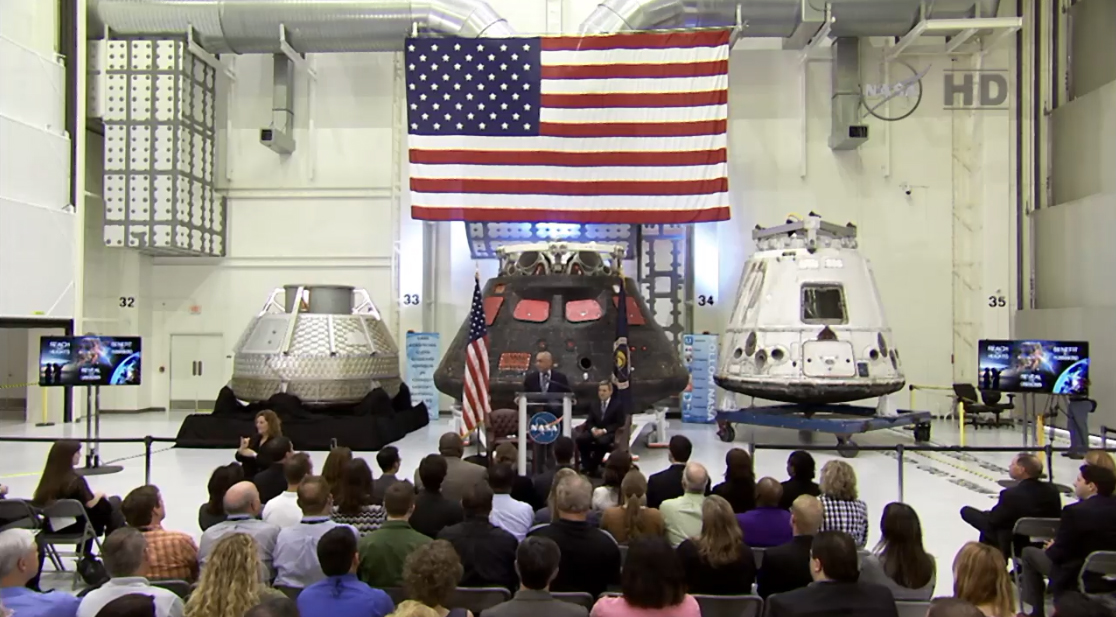White House Seeks $18.5 Billion NASA Budget, with Deep Space in Mind

Breaking space news, the latest updates on rocket launches, skywatching events and more!
You are now subscribed
Your newsletter sign-up was successful
Want to add more newsletters?

Delivered daily
Daily Newsletter
Breaking space news, the latest updates on rocket launches, skywatching events and more!

Once a month
Watch This Space
Sign up to our monthly entertainment newsletter to keep up with all our coverage of the latest sci-fi and space movies, tv shows, games and books.

Once a week
Night Sky This Week
Discover this week's must-see night sky events, moon phases, and stunning astrophotos. Sign up for our skywatching newsletter and explore the universe with us!

Twice a month
Strange New Words
Space.com's Sci-Fi Reader's Club. Read a sci-fi short story every month and join a virtual community of fellow science fiction fans!
The White House budget proposal for NASA in 2016 calls for a $500 million boost over the 2015 enacted budget and would keep NASA on its path to Mars, NASA chief Charles Bolden says.
The $18.5 billion budget request, presented by Bolden today (Feb. 2), includes funding for developing a mission to Jupiter's moon Europa, and the agency's asteroid redirect mission (ARM). Officials think ARM could help pave the way for crewed missions to the Red Planet by the 2030s.
"NASA is firmly on a journey to Mars," Bolden said. "Make no mistake, this journey will help guide and define our generation." [Red Planet or Bust: 5 Manned Mars Mission Ideas]
The new fiscal year 2016 budget, if enacted as it stands now, doesn't come without sacrifice. If the budget request proceeds as is, NASA could end the long-running Opportunity rover's mission on Mars next year. Officials with the space agency cited Opportunity's "signs of age, including recent problems with its flash memory," as cause for ending its operations in the budget proposal.
Officials still aren't sure that the program will end, however. NASA Chief Financial Officer David Radzanowski said that officials will re-evaluate the planned ending of the mission during the next year to see if it makes sense to keep the rover online going forward. Like the new budget request, NASA officials also expected Opportunity's mission to end in fiscal year 2015, but they found the money to keep it going, Radzanowski added. Opportunity has been roaming the surface of the Red Planet for more than 10 years.
The NASA budget request would also end operations for the Lunar Reconnaissance Orbiter (LRO for short), but, like Opportunity, officials are looking for additional funding to keep the mission going through fiscal year 2016, Radzanowski said. It was also unfunded in the initial 2015 budget before more money was secured. LRO has been orbiting the moon since 2009, helping scientists learn more about lunar water and map the lunar surface.
NASA's Orion spacecraft program — designed to bring humans to deep-space destinations like Mars — and Space Launch System mega-rocket are funded under the budget request. Orion is expected to receive about $1.1 billion for 2016, with the SLS receiving about $1.35 billion. Both programs are funded at lower levels than the budget enacted in 2015.
Breaking space news, the latest updates on rocket launches, skywatching events and more!
On the whole, Bolden sees NASA's future as bright.
"That the idea we’re adrift is an empty hook trying to catch yesterday's fish," Bolden said. "I couldn't be more excited about our future. We're making steady progress and continuing to reach for new heights."
The new budget request also includes funds for the continuation of the Commercial Crew Program, designed to help private companies create space systems that can ferry astronauts to and from the International Space Station. The program is getting a boost this year, with about a $1.2 billion budget, up from the $805 million allotted in 2015. The private spaceflight companies Boeing and SpaceX are tasked with delivering astronauts to the station under the program by 2017.
Under the proposed budget, NASA should be given a little less than $5.3 billion for science missions, including $620 million to continue the development of the James Webb Space Telescope, expected to launch as the Hubble Space Telescope's successor in 2018.
The science budget amount also includes $1.36 billion for planetary science, with funds earmarked for developing the agency's plan to launch a mission to Europa, according to a budget fact sheet.
The request also asks NASA to develop the next in the series of Landsat satellites, Earth-gazing missions that monitor the planet's climate and observe the planet's deforestation among other objectives.
"I can unequivocally say that the state of NASA is strong," Bolden said.
Learn more about the NASA budget directly through the space agency: http://www.nasa.gov/news/budget/index.html#.VM_sC2TF_hr
Follow Miriam Kramer @mirikramer. Follow us @Spacedotcom, Facebook and Google+. Original article on Space.com.

Miriam Kramer joined Space.com as a Staff Writer in December 2012. Since then, she has floated in weightlessness on a zero-gravity flight, felt the pull of 4-Gs in a trainer aircraft and watched rockets soar into space from Florida and Virginia. She also served as Space.com's lead space entertainment reporter, and enjoys all aspects of space news, astronomy and commercial spaceflight. Miriam has also presented space stories during live interviews with Fox News and other TV and radio outlets. She originally hails from Knoxville, Tennessee where she and her family would take trips to dark spots on the outskirts of town to watch meteor showers every year. She loves to travel and one day hopes to see the northern lights in person. Miriam is currently a space reporter with Axios, writing the Axios Space newsletter. You can follow Miriam on Twitter.
